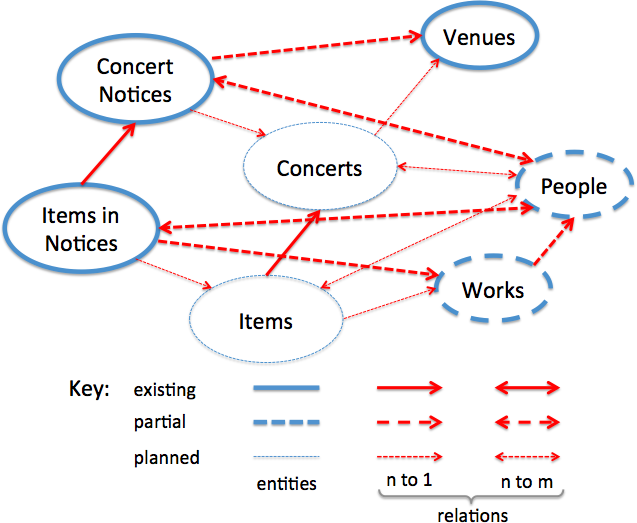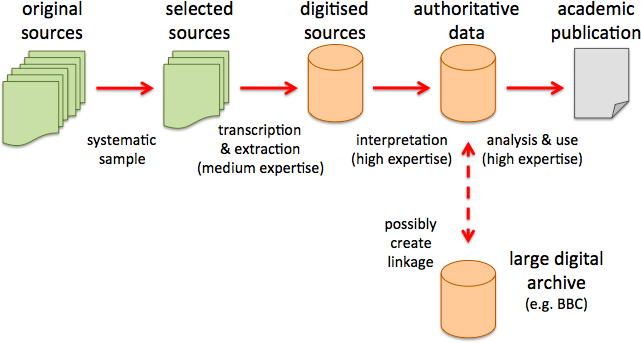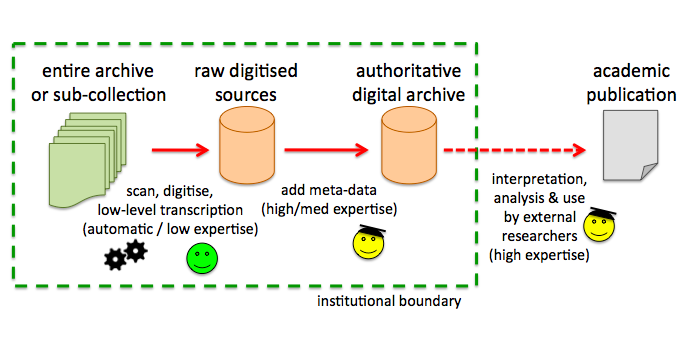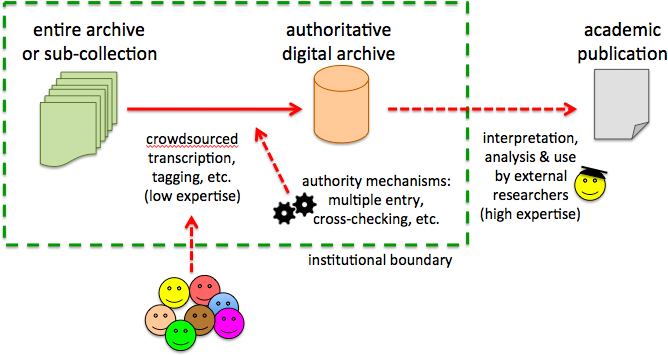Abstract
The transformative promise of the digital humanities is not without problems. This paper looks at digital archive curation using a database of 19th-century London concerts as a case study. We examine some of the barriers faced in its development, related to expertise, volume and complexity, the gap between cost and benefit, and the desire for an authoritative and complete dataset that forces a particular linear process of curation. We explore the potential for more radical approaches where curation and use are interleaved, and where digitally maintained provenance allows professional judgement to be applied to incomplete, crowdsourced, or automatically processed data.
Keywords: musicology, performance history, digital archives, digital humanities, ephemera, concerts, linked data, open data
Acknowledgements
In Concert is a mini-project of Transforming Musicology, itself funded under the AHRC Digital Transformations in the Arts and Humanities scheme.
Concert Life in 19th-Century London database project, funded by the University of Huddersfield and Oxford Brookes University (1997–2001), and the Arts and Humanities Research Board (UK) and University of Leeds (2001–04). Research Assistants: AHRB Research Assistant (with studentship) Ann Royle (1999–2004). Project Research Assistants: Stephen Follows (2001–03); Vania Schittenhelm (2000–02); Emma Peake (2000); Michelle Brachet (1998–2000); Clare Lyon (1998–2000); Jamie Savan (1998–99); James Marshall (1998–99). We would like to record our thanks to the research assistants for their integral contribution to Phase I of the project.
References
- von Ahn, L., Maurer, B., McMillen, C., Abraham, D., and Blum, M. (2008). reCAPTCHA: Human-Based Character Recognition via Web Security Measures. Science 12 September 2008,. 321(5895):1465-1468. DOI: 10.1126/science.1160379
- Bashford, C., Cowgill, R. and McVeigh, S. (2000). The Concert Life in Nineteenth-Century London Database, in Nineteenth-Century British Music Studies, 2, ed. by J. Dibble and B. Zon (Aldershot: Ashgate, 2000), 1-12.
- Bell, D.(2004). Infinite Archives, SubStance, Vol. 33, No. 3, Issue 105, pp. 148-161, University of Wisconsin Press. http://www.jstor.org/stable/3685549
- Berners-Lee, T., Hendler, J., and Lassilia, O. (2001). The semantic web. Scientific American, 284(5):34–44. DOI: 10.1038/scientificamerican0501-34
- Bizer, C., Heath, T., and Berners-Lee, T (2009). Linked data - the story so far. Int. J. Semantic Web Inf. Syst., 5(3):1–22. DOI: 10.4018/jswis.2009081901
- Borges, J. (1946). Del rigor en la ciencia. (tr. ‘On Exactitude in Science’) Los Anales de Buenos Aires 1.3 (Mar. 1946):53.
- Concert Programmes online database. accessed 25/6/2014. http://www.concertprogrammes.org.uk/html/about
- DBpedia . accessed 23/6/2014. http://dbpedia.org/About
- Elmagarmid, A., Ipeirotis, P., and Verykios, V. (2007). Duplicate Record Detection: A Survey, IEEE Transactions on Knowledge and Data Engineering 19 (1): pp. 1–16. doi:10.1109/TKDE.2007.9
- C. Fleet, Kowal, K., and Přidal, P. (2012). Georeferencer: Crowdsourced Georeferencing for Map Library Collections. D-Lib Magazine, November/December 2012, 18(11/12). doi:10.1045/november2012-fleet
- Gemmell, G. (2014). Should Google Be Mapping Tribal Lands? Daily Beast, TECH + HEALTH, 4th June 2014. http://www.thedailybeast.com/articles/2014/06/ 04/should-google-be-mapping-tribal-lands.html
- Google (2014). Indigenous Mapping Day is August 9, 2013. Show your support & improve Google Maps! Google, Map your World Community. https://sites.google.com/site/ mapyourworldcommunity/indigenous-mapping
- Halevy, A., Norvig, P. and Pereira, F. (2009). The Unreasonable Effectiveness of Data, Intelligent Systems, IEEE , vol.24, no.2, pp.8,12, March-April 2009. doi: 10.1109/MIS.2009.36
- Heath, T., and Bizer, C. (2011) Linked Data: Evolving the Web into a Global Data Space (1st edition). Synthesis Lectures on the Semantic Web: Theory and Technology, 1(1) 1-136. Morgan & Claypool. http://linkeddatabook.com/editions/1.0/
- In Concert (2014). accessed 23/6/2014 http://inconcert.datatodata.com
- Leverhulme (2014). Research Project Grants. The Leverhulme Trust. accessed 23/6/2014. http://leverhulme.ac.uk/funding/RPG/RPG.cfm
- McVeigh, S. (1992–2014) Calendar of London Concerts 1750–1800. (Dataset) Goldsmiths, University of London. http://research.gold.ac.uk/10342/
- Plato. Phaedrus, circa 360 B.C.E (tr. Benjamin Jowett) http://www.gutenberg.org/files/1636/1636-h/1636-h.htm
- Raimond, Y., Scott, T., Sinclair, P., Miller, L., Betts, S., and McNamara, F. (2010). Case Study: Use of Semantic Web Technologies on the BBC Web Sites. Semantic Web Use Cases and Case Studies, W3C. January 2010. http://www.w3.org/2001/sw/sweo/public/UseCases/BBC/
- Ramduny-Ellis, D., Dix, A., Rayson, P., Onditi, V., Sommerville, I. and Ransom, J. (2005). Artefacts as designed, Artefacts as used: resources for uncovering activity dynamics. Cog. Tech. and Work, 7(2):76-87 http://alandix.com/academic/papers/CTW-artefacts-2005/
- Part 2D: Main Panel D criteria, Panel criteria and working methods, REF2014, Research Excellence Framework. January 2012. http://www.ref.ac.uk/pubs/2012-01/
- schraefel, m.c., Smith, D., Russel, A., Owens, A., Harris, C. and Wilson, M. (2005) The mSpace Classical Music Explorer: Improving Access to Classical Music for Real People. In, V MUSICNETWORK OPEN WORKSHOP: Integration of Music in Multimedia Applications, Vienna, Austria, 4–5 Jul 2005. http://eprints.soton.ac.uk/261033/
- Sommerville, I. (2010). Software Engineering. Harlow, England: Addison-Wesley. ISBN: 978-0-13-703515-1
- API. Transforming Musicology. Accessed 23 June 2014. http://www.transforming-musicology.org/api/
|

Structure of the Concert Life in 19th-Century London database project .
[zoom image]

Concert Life in 19th-Century London database – a classic digital humanities process?
[zoom image]

Digital archive production and use
[zoom image]

Crowdsourced digital archives
[zoom image]

Partial completeness: horizontal and vertical slices
[zoom image]